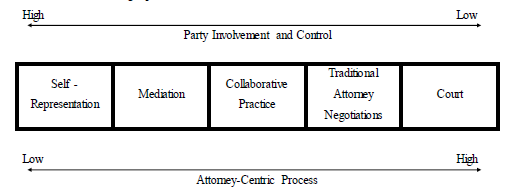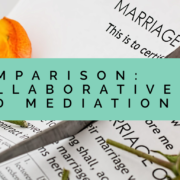Explanation of Collaborative Process Consent Form
When you come into my office to learn about collaborative divorce, I want to make sure that you understand the process. Yes, collaborative divorce helps families day in and day out, but there are potential negatives that you need to know, as well. Further, Rule 4-1.19 of the Florida Bar Rules of Professional Conduct requires me to help ensure you have informed consent before entering the collaborative process.
Accordingly, I will sit down with you to discuss all aspects of collaborative practice. At the end, I will provide you with an Explanation of Collaborative Process Consent Form to sign. I have designed this form, but it is based on one created by Robert J. Merlin, an attorney in South Florida who was the point person for the adoption of Rule 4-1.19 by the Florida Supreme Court.
Explanation of Collaborative Process Consent Form
We had a meeting with you on __________(Date) during which we discussed your family matter. We informed you during the meeting and with materials that we provided you of the following:
A. The choices that you have for handling your family matter include reconciliation as well as the following options:
B. The benefits and risks of each of the process choices to handle your family matter;
C. The nature and scope of your matter to be handled if you choose to use the Collaborative Process and how that process generally works;
D. That the Collaborative Process cannot be used by you unless your spouse/partner chooses to use that process as well;
E. The material benefits and risks of handling your matter using the Collaborative Process;
F. If you choose to use the Collaborative Process, your participation is voluntary and either you or your spouse/partner can choose to leave the process at any time;
G. That if you and your spouse/partner choose to use the Collaborative Process, the process will be terminated if you or your spouse/partner initiate proceedings or seek court intervention except in limited circumstances;
H. That if you and your spouse/partner choose to use the Collaborative Process, we and your spouse/partner’s Collaborative attorney will be disqualified from representing you and your spouse/partner in any future litigation in court against each other;
I. In the Collaborative Process, both you and your spouse/partner must retain an attorney. Our fees and costs will be billed pursuant to the Retainer Agreement/Contract that you have entered into with us. The other attorney will also bill according to his or her retainer agreement;
J. We generally use a neutral facilitator in the Collaborative Process, who most likely will have a specialty in adult communications, childhood development, and/or family dynamics. That person will have his/her own retainer agreement with you and your spouse/partner. The facilitator will likely require a retainer and will charge a separate hourly rate for his/her services;
K. Your case may also involve a neutral financial professional, such as a collaboratively-trained accountant or a financial planner. You and your spouse/partner will also enter into a retainer agreement with the neutral financial professional. That professional may require a retainer. The financial professional will bill on an hourly basis for his/her services and those of his/her staff. The hourly rates will vary depending upon who works on your matter;
L. It is impossible to estimate the total cost of your matter because there are so many variables. At this time, we do not know what the issues in dispute will be with your spouse/partner. The simpler and fewer disputed issues that you have with your spouse/partner, and the smaller your estate, the lower the total cost of the process will be. A significant factor in the total cost for the Collaborative Process will be how much you and your spouse/partner cooperate with each other and the professionals. Cooperation should reduce the cost for each of the professionals and a lack of cooperation will cause the professionals to spend more time, which will cost you and your spouse/partner more money;
M. You will receive regular invoices from our office and you should receive invoices from the facilitator and the financial professional. Costs may also be brought up as an agenda item during full team meetings. This is to keep you informed about how much this process is costing;
N. The cost of a process to resolve family matters is an important factor to consider when you negotiate with the other client. Our experience has been that the Collaborative Process should cost less money and take less time than traditional litigation; however, it is not cheap. Family law or divorce is not cheap. It also likely will not be resolved as quickly as you like; things can seem to move excruciatingly slow when you are in the midst of the trauma of a family law matter. But both these things are true regardless of the process you choose, yet we are confident in saying that, in general, collaborative process is a better way. We will talk to you regularly about the financial and emotional costs of decisions that you are going to make. Please feel free to discuss with us any questions that you have about the Collaborative Process and the costs involved; and
O. We look forward to helping you to resolve all matters with your spouse/partner. Our goal will be to minimize the financial, emotional and time costs to your family. Please feel free to contact us if you ever have any questions about anything related to your matter and how we are representing you.
Best regards,
/s/ Adam B. Cordover
I understand that it is not possible for my Collaborative attorney to determine in advance the exact amount of time that will be needed to complete my matter or how much it will cost. I understand that my Collaborative attorney will use his or her best judgment to determine the amount of time, who is to perform the work, and the nature of the services to be performed on my behalf. I acknowledge that I will be kept fully informed by my Collaborative attorney of the time devoted to my matter through regular billings.
I acknowledge that I have read and that I understand this Explanation of the Collaborative Process.
| Dated: _____________, 20___ | ||
|
|
||
| Signature | Printed Name |
Adam B. Cordover is a Florida Supreme Court Certified Family Law Mediator and Collaborative Attorney. Adam is on the Board of the International Academy of Collaborative Professionals and Florida Academy of Collaborative Professionals, and he is an author of an American Bar Association book on collaborative practice. Adam teaches attorneys, mental health professionals, financial professionals, and other how to work in the Collaborative Process.







